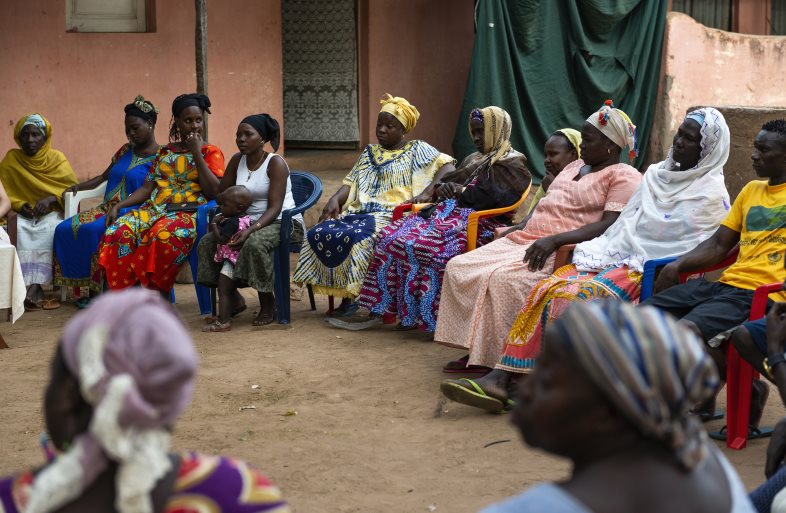Improving diagnosis of life-threatening infection in west Africa
Experts at The University of Manchester uncovered potential misdiagnosis of a life-threatening lung infection (histoplasmosis) in people with HIV and AIDS in Nigeria and Ghana, prompting new testing to reduce deaths.
The dangers of misdiagnosis
Histoplasmosis is a lung infection caused by inhaling spores from a fungus (Histoplasma capsulatum) found in bird and bat droppings. Histoplasmosis is rare in Europe, but common in Latin America, the Caribbean and Southeast Asia. Some parts of Africa also harbour this fungus in its soil.
In certain countries, like the Americas, histoplasmosis has been recognised and treated for years, while in other regions it is regularly misdiagnosed. This can lead to fatal consequences, particularly for patients with HIV and AIDS.
University academics have now set out to research fungal infections in Africa and have been finding that AIDS patients are being misdiagnosed and treated for tuberculosis (TB), rather than histoplasmosis.
In 2022, around 630,000 people worldwide died from AIDS-related illnesses*, with approximately 50% of these mortalities occurring in Africa. In the same year, a survey of fungal diagnostics in Africa found almost no country carrying out urine antigen testing for Histoplasma, despite being a World Health Organisation (WHO) Essential Diagnostic.
Separate work in Guatemala, which is hyperendemic for histoplasmosis, carried out a three-year public health diagnostic program in 6,366 HIV/AIDS patients. It showed that rapid diagnosis with urine antigen testing reduced deaths from histoplasmosis by 29%.

Understanding histoplasmosis in Africa
Research by two of The University of Manchester’s PhD students uncovered how frequent histoplasmosis is in Nigeria and Ghana, resulting in recommendations for diagnostic practices and practical training for healthcare professionals.
Nigeria
Dr Rita Oladele, now a leading fungal researcher based at the University of Lagos, surveyed the totality of documented literature on histoplasmosis in Africa as part of her 2018 PhD project, which summarised that histoplasmosis has markedly increased, but is under-recognised.
Dr Oladele went on to investigate the prevalence of histoplasmosis in Nigeria’s HIV population. Findings showed that of nearly 1,000 HIV-infected people from ten areas of the country: 7.7% presented with histoplasmosis, 11.8% with TB, and a few with both infections.
Using this insight, Dr Oladele has trained more than 300 healthcare workers in Nigeria to diagnose and treat histoplasmosis in AIDS patients, as well as developing Nigeria’s first national Mycology Reference Laboratory, which provides services for the diagnosis and management of fungal infections.
Ghana
In Ghana, Bright Ocansey (a PhD student at The University of Manchester) found histoplasmosis in 4.7% of 150 HIV-infected patients (compared to cryptococcal meningitis at 2%), another critically important finding relating to the incidences of histoplasmosis. The research summarised the need to improve awareness of histoplasmosis among clinicians in Ghana and the need to enhance tests for rapid diagnosis.
Instigating further testing and treatment
Recognition of further testing and the need for treatment into histoplasmosis in Africa has been conducted by Global Action For Fungal Infections (GAFFI), a non-government organisation started by Professor David Denning, one of Manchester’s leaders in global health research.
GAFFI submitted an open letter to leading global health organisations highlighting the organisation’s findings and calling for more rapid, direct access to testing, increased awareness of the endemic areas, and to encourage more scientific investigation into diagnosis and treatment.
Advancing testing capabilities
A new diagnostic urine test has transformed detection rates and following The University of Manchester’s studies in Nigeria and Ghana, these countries are starting to use this test routinely to detect numerous cases of histoplasmosis, guiding treatment and saving lives.
Future partnering with the Africa Centre for Disease Control (Africa CDC) will contribute to the rollout of this testing in multiple African countries. Given 40 years of AIDS being a recognised illness and reported incidences of misdiagnosis, Histoplasma antigen testing is long overdue.
Citations and further reading
- The Conversation - global deaths from fungal disease
- The Lancet - global incidence and mortality of severe fungal disease
- National Library of Medicine - incidence of Histoplasmosis in people with HIV
- Histoplasmosis in Africa - An emerging or neglected disease? (3.3MB, PDF)
- GAFFI - Histoplasmosis in Africa is under-reported
- *UNAIDS - global HIV statistics fact sheet (248KB, PDF)
Meet the experts
- David Denning, Professor of Infectious Diseases
- Bright Ocansey, PhD student
